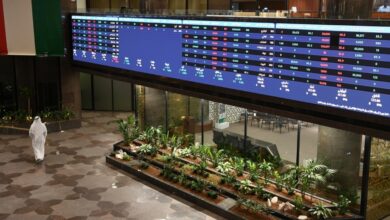
The Al-Shall Economic Center weekly report highlighted that, in line with the International Monetary Fund’s (IMF) global economic outlook, the World Bank has raised concerns about the heightened level of uncertainty in the global economy. As a result, economic growth forecasts are subject to frequent revisions.
The World Bank, in its report released on April 23, downgraded its growth forecast for the six Gulf Cooperation Council (GCC) countries by 0.9% for 2025, while slightly increasing it by 0.1% for 2026.
Specifically, the forecast for the GCC’s combined growth in 2025 was revised down from 4.1% to 3.2%, and for 2026, it was raised from 4.4% to 4.5%.
Al-Shall noted that its growth projections for 2025 and 2026 were revised downward for three of the six GCC countries. Saudi Arabia, the region’s largest economy, saw its growth estimates reduced by -2.2% and -0.3% for both years, bringing its expected growth to 2.8% in 2025 and 4.5% in 2026.
Similarly, the growth projections for both Qatar and Kuwait were also lowered by -0.3% and -0.1%, respectively, with Qatar’s growth forecast now at 2.4% for 2025 and 5.4% for 2026, and Kuwait’s growth expected at 2.2% and 2.7% for the same years.
In contrast, Bahrain’s forecast for 2025 was raised from 3.3% to 3.5%, but its 2026 projection was cut from 3.3% to 3.0%. The UAE, benefiting from a less oil-dependent economy, had its 2025 forecast raised from 4.1% to 4.6%, and its 2026 projection increased from 4.1% to 4.9%.
Oman also saw an upward revision in its growth forecasts, with 2025 rising from 2.7% to 3.0%, and 2026 from 3.2% to 3.7%.
The UAE is expected to have the highest growth rate for 2025 at 4.6%, while Kuwait is projected to have the lowest at 2.2%. For 2026, Qatar leads with a forecast of 5.4%, while Kuwait remains at the bottom with 2.7%.
Al-Shall further emphasized that Kuwait’s share of the combined GDP of the GCC countries has declined from 11.0% in 2004 to an estimated 7.2% in 2025, according to IMF figures.
This signals a significant flaw in Kuwait’s development model. Al-Shall argued that international financial institutions and key public and private entities agree that Kuwait’s economy experiences the most severe contractions during global downturns and the weakest growth during periods of economic expansion—unless the boom is driven solely by rising oil prices.
Al-Shall stressed that these observations are not merely opinions, but conclusive indicators of the need for Kuwait to adopt a more sustainable development approach, warning that delaying such reforms would have unbearable costs.













